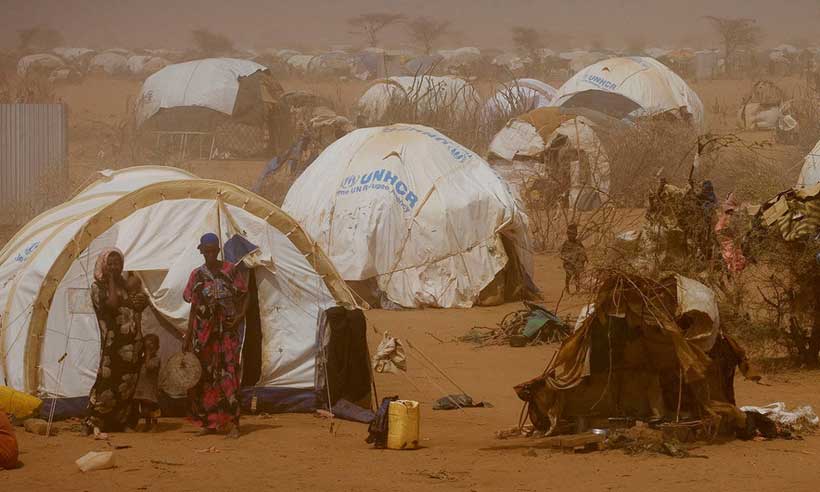Turkey’s Humanitarian Diplomacy in Somalia:
Since the 2000s, Turkey has made humanitarian diplomacy a primary element of its foreign policy (Altunisik, 2019). Turkey’s involvement in Somalia can be seen as one of the most prominent examples of humanitarian diplomacy. A severe famine occurred in Somalia and Somaliland during the East African drought in 2011, resulting in nearly 260,000 deaths (Şeysane & Tanriverdi, 2022). This provided an initial entry point for Turkey to provide aid to Somalia. This involvement began with Prime Minister Recep Tayyip Erdoğan’s visit in August 2011 (Thiessen & Ozerdem, 2019). In recent years, Somalia has become the largest recipient of foreign aid in Africa, with the majority of support coming from Turkey. Somalia consistently ranks among the top three countries receiving aid from Turkey over the past five years (Çöğen, A, 2016).
Turkey’s humanitarian intervention in Somaliland in 2011 had dual objectives: to provide aid to those in need and to raise international awareness of the humanitarian situation in Somalia (Karahan, 2020). The humanitarian aid provided by Turkey in the early stages in Somalia largely consisted of emergency assistance such as clothing, food, medical services, and shelter equipment (Sazak & Wood, 2017). Additionally, Turkey provided substantial financial aid, with $77.72 million in emergency aid in 2011, followed by $47.54 million in 2012 (Sucuoglu and Stearns, 2016). Furthermore, Turkey’s involvement in the following years became more comprehensive. In 2013, Turkey also provided development aid and capacity-building in Somalia focusing on infrastructure, education, and health. Turkey also helped restore peace in Somalia by engaging in mediation efforts between warring parties in Somalia, such as facilitating dialogue between the government of Somaliland and the Transitional Federal Government in Mogadishu (Şeysane & Tanriverdi, 2022). Turkey’s humanitarian diplomacy in Somalia involves various state institutions, government entities, and non-governmental organizations.
Turkey’s advocacy for humanity in Somalia is also carried out through international forums with its active involvement in the United Nations (UN) by delivering speeches to raise awareness of humanitarian events. These steps enable Turkey to increase international awareness and contribute more actively in Somalia. Furthermore, these efforts are also aimed at strengthening Turkey’s image as an influential humanitarian actor in global politics. Overall, the experience in Somalia has been specifically referenced by Turkish elite officials in identifying the “distinctive brand” of Turkish humanitarian diplomacy. President Erdoğan specifically emphasized the importance of Somalia in humanitarian approaches, stating that “with Somalia, the Turkish aid model has been recognized in literature” (Şeysane & Tanriverdi, 2022).
Humanitarian Diplomacy Turkey: Humanitarian vs National Interest
Turkey’s massive involvement in conducting humanitarian diplomacy in Somalia is inseparable from the political bias of national interests it seeks to pursue. Turkey sees the urgency to engage in Somalia due to several aspects including geopolitical, economic, ideological, and diplomatic considerations. In terms of geopolitics, Turkey seeks to engage in Somalia due to a power vacuum resulting from poor internal political dynamics in Somalia. This power vacuum opens the door and facilitates Turkey to spread its influence through other aspects such as economics, diplomacy, and ideology. Furthermore, in terms of economics, Turkey as an emerging power requires new markets to boost its economic growth. Countries in the African region, including Somalia, have great potential for market economics. This presents a significant opportunity for economic and trade cooperation that will enhance Turkey’s economy (Çöğen, 2016).
Moreover, Turkey’s motivation for involvement in Somalia also lies in diplomatic aspects. With the humanitarian diplomacy model implemented as part of Turkey’s foreign policy, strong diplomatic relations have been established with countries in Africa. Turkey’s embassies in the African region have increased from 12 to 39 in the last 10 years. Consistent with this, Turkey’s humanitarian diplomacy also reaffirms Turkey’s image on the international stage as a country that respects humanity. Lastly, there is an ideological aspect where ideological constructions exist not only among political elites in Turkey but also among civil society and NGOs explaining that Turkey shares solidarity with the people of Somalia. The sense of shared fate and based on fraternity strengthens Turkey’s humanitarian diplomacy in Somalia (Çöğen, 2016).
Humanitarian diplomacy differs from diplomacy in general because humanitarian diplomacy holds four main principles of humanitarian action according to rules in 2 UN General Assembly Resolutions Article 46/182 and 58/114 along with the Geneva Conventions and Protocols I-IV, namely the principles of humanity, impartiality, independence, and neutrality to ensure that diplomacy is purely based on humanitarian grounds and not politicized based on individual interests (Barnett, 2011). Based on Turkey’s reasons and motivations for involvement in Somalia, it is evident that the humanitarian diplomacy conducted does not adhere to the main principles that should be followed. Turkey violates the aspects of impartiality and neutrality by basing its diplomacy on its national interests in geopolitical, economic, diplomatic, and ideological aspects. This shows that Turkey violates the morality aspects of humanitarian values and violates international humanitarian law which also respects the principles of humanitarian action.
Conclusion:
Therefore, it can be concluded that various forms of aid efforts provided as part of Turkey’s humanitarian diplomacy in Somalia indeed show that Turkey is serious and concerned about events related to humanitarian issues. However, behind the humanitarian diplomacy manifested in various aids, Turkey has not been seen to truly carry out this solely on humanitarian grounds. There are national interests pursued by Turkey in the African region. This certainly violates moral and legal responsibilities in the implementation of humanitarian action principles. Thus, it is true that Turkey’s humanitarian diplomacy in Somalia is a means to achieve national interests rather than purely based on respect for humanity.
